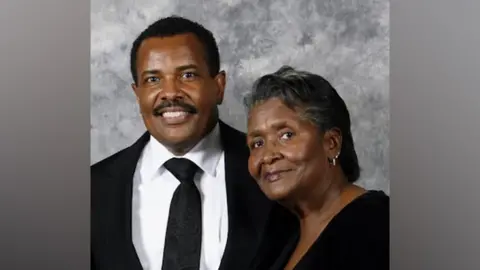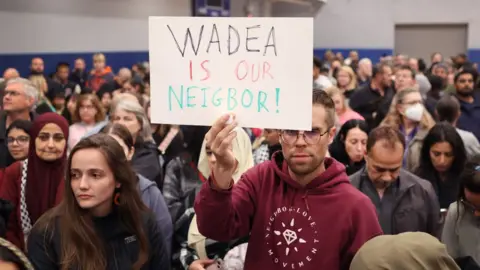US hate crimes are rising - this is how to stop them
 Garnell Whitfield
Garnell WhitfieldHate crimes reached an all-time high in the US last year, according to the FBI. But there are some who believe the trend can be reversed.
On 13 May 2022, 66-year-old Garnell Whitfield spent the day with his 86-year-old mother constructing a raised planter box for her garden that he hoped to gift her for mother's day.
But Ms Whitfield would not live to see the fruits of his labour. She was murdered by a white supremacist as she stopped by Tops supermarket in Buffalo, New York the next day to buy seeds for the garden.
She was the oldest of ten black people who were killed by the 18-year-old gunman, who authorities say left behind racist diatribes detailing his plans to target the store.
Her son, Mr Whitfield, told the BBC her death left an indelible mark on his family and opened wounds of their previous experiences facing racism in America.
"To lose my mother - who lived her entire life never ever being completely free, never ever being accepted as a black woman in America - to have been killed by a white supremacist, it has been absolutely devastating," he said.
"When you think about where we are in this country, to be dealing with this cancer, this epidemic of hate and white supremacy, it's unsettling," he added.
Newly released data from the FBI shows hate crimes in 2022 reached an all-time high since the agency began tracking such incidents, up nearly 7% from 2021.
Experts who spoke with the BBC say a host of factors, including aggressive political rhetoric and social media, have contributed to this uptick in violence - and they worry a heated upcoming presidential campaign season and violence in the Middle East could worsen the trend.
Their fears were reinforced after a 6-year-old boy was murdered in Plainfield, Illinois last weekend in what authorities described as an anti-Muslim attack.
Officials say a landlord stabbed the boy and his mother because of the ongoing conflict between Hamas and Israel.
But both experts and people impacted by these crimes say it's not too late.
"Change occurs in the hearts and minds of people," Mr Whitfield said. "And that's what we have to appeal to - each other's humanity."
'A grim landscape'
The FBI began collecting data on hate crimes in 1991, and since then, incidents have continued to rise.
In 2022, anti-black or anti-African American hate crimes were the most commonly reported, followed by anti-Jewish and anti-gay incidents, according to the FBI. In total, the US recorded 11,643 hate crimes that year, including incidents of vandalism, intimidation and assault.
Part of the rise can be attributed to improvements in reporting each year, as Americans learn to speak up about the incidents and more agencies share information, experts said.
But the data has still at times proven flawed.
For its information, the FBI relies on thousands of federal, state, local, tribal and university law enforcement agencies to voluntarily submit reports. But in 2022, for instance, only 14,631 of roughly 18,000 law enforcement agencies submitted hate crime data to the FBI.
Certain states in particular also likely undercount the number of hate crimes, including Florida, which in 2021 recorded a total of 148 incidents to the FBI, the same amount as just the city of Boston, according to Brian Levin, the founding director for the Center for the Study of Hate and Extremism, which produces its own reports on US hate crimes data.
Still, the US has seen a "disturbing increase" across the board in violent hate crimes such as assaults and aggravated assaults in recent years, he said.
Most minority groups have not been spared, said Jessica Reaves, the editorial director at the Anti-Defamation League Center on Extremism, which tracks incidents of bigotry and extremism.
"We've seen more Jewish institutions being targeted," she said. "We've seen a rise in expressions of anti-black bigotry and hate, including white supremacy."
"It's a grim landscape," she added.
Current events fuel bigotry
These spikes can coincide with events in the news.
Over the past week, Mr Levin said preliminary data suggests there has been an uptick in both anti-Muslim and antisemitic hate crimes, including hate speech online, after the start of the Israel-Hamas war.
"This wave is not cresting yet - this wave is swelling," he said. "If we're looking at a drawn-out conflict in the Middle East, this can be a terrible thing in regards to anti-Muslim and antisemitic hate crimes."
How politicians and others in the spotlight respond to world events can also make a big impact, said Mr Levin.
Hate crimes at times rose in the days after former President Donald Trump made public remarks about race, he noted.
The US saw a large spike in hate crimes after the 2017 Charlottesville white-supremacist rally, not in the immediate aftermath, but the following week, after Mr Trump said there were "fine people on both sides" of the protest.
Hate crimes have continued to rise under President Joe Biden. Experts said the next presidential election season - and the aggressive political rhetoric that often comes with campaigning - could potentially lead to more violence and extremism.
The number of hate-crime incidents has risen every single election year since the FBI began collecting hate crime data, according to Mr Levin.
Quelling violence
While politicians have the power to spread hatred, they also have the power to help quell it, Mr Levin said. He pointed to a speech former President George W Bush gave six days after the 11 September 2001 attacks promoting tolerance toward Muslim people.
Hate crime incidents against Muslims "dropped precipitously" over the next day after the speech, he said.
Popular online figures have also played a role in spreading misinformation and hate to large audiences - and could help put a stop to it, experts say.
"Increasingly, social media is becoming so wild and unrestrained that it is creating a place where bigotry, stereotypes, conspiracy and lies go around the world seven times before the truth puts on its boots," said Mr Levin.
Extremism researchers said the deregulation of social media platforms over the years has allowed threats and hatred to linger online for longer and reach more massive audiences. Social media sites like Parler, Gab, and Gettr - which have pitched themselves as "free speech platforms" that aim to avoid censorship - have also come under fire for allowing hate speech to run rampant online.
The Anti-Defamation League has suggested several policy measures for reducing hatred on social media, including requiring companies to disclose their content moderation policies and to provide data about policy enforcement.
Communities, leaders and social media platforms can all take a host of steps to combat mounting aggression, experts say.
Mr Levin said more public institutions must report hate crimes.
Community members themselves must also become engaged in the fight against bigotry and rally around those who have been targeted, as many Americans have already begun to do, Ms Reeves said.
 Getty Images
Getty ImagesMr Whitfield is one of them. Since his mother's death, he's been protesting against racism and white supremacy, speaking with leaders and others around the country about what he and so many other minority groups have endured.
One of his goals, he said, is to encourage those who have previously been "sitting on the side-lines" to call out racist behaviour.
"We've got to have the courage to speak up," he said. "We've got to have the courage to put our own false sense of security and comfortability at risk."
